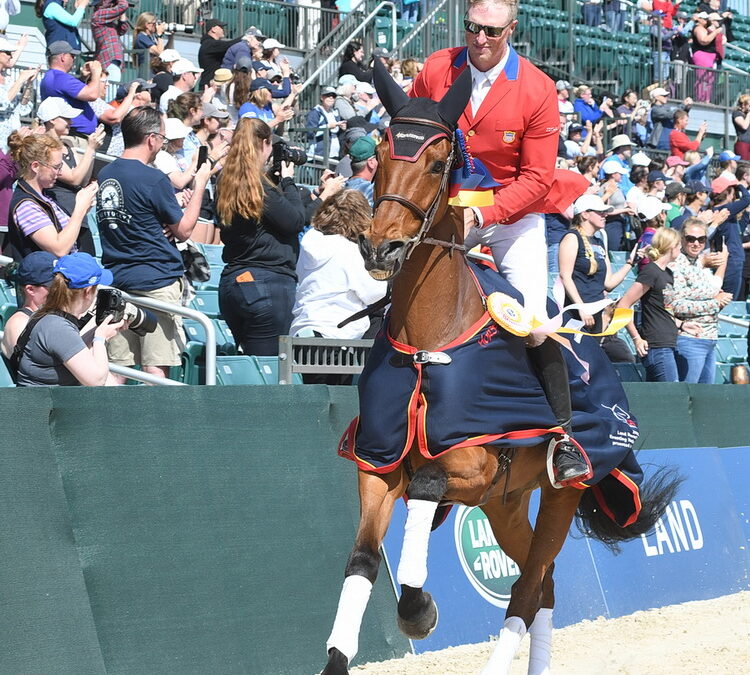
by Nancy Jaffer | Feb 3, 2025
A team gold medal and individual fourth place in eventing at the Pan American Games, along with the best U.S. finish in the discipline at the 2021 Tokyo Olympics, all have made Doug Payne crave more international team experience.
But he’s going in a different direction as he turns 44 this month, having moved out of eventing to focus on grand prix show jumping.
“It’s been a process the last seven years,” he explained, talking about competing in two disciplines simultaneously. Last year at the Defender Kentucky 5-star, for instance, he rode his eventing horse in the afternoon and other mounts in the jumpers at night.
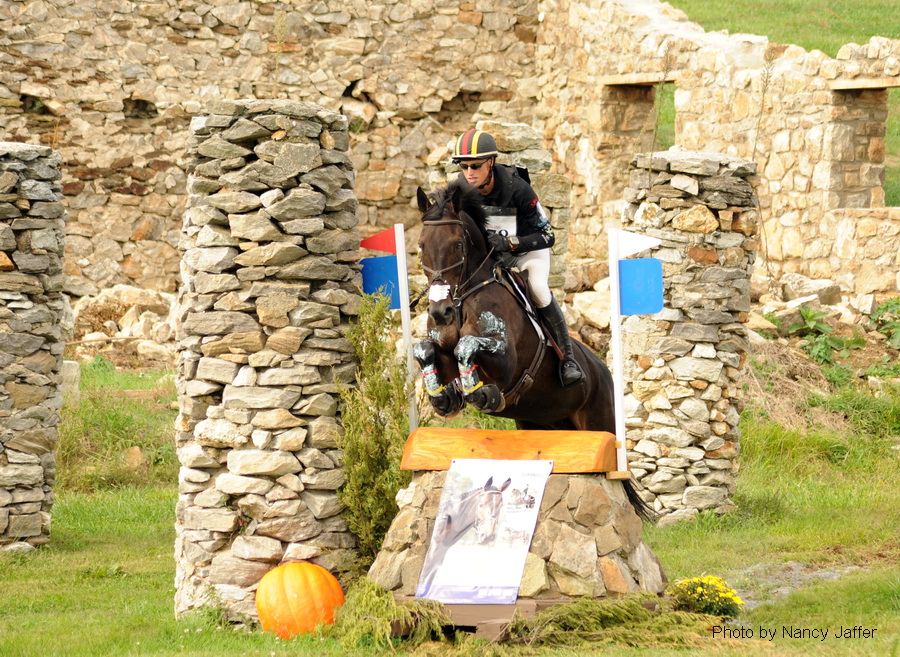
Doug Payne’s prowess cross-country was notable, but he’s moving on to top-level show jumpingl.
Quantum Leap, his entry for that 2024 5-star, was fifteenth after cross-country, but withdrawn in the second vet check. He has what Doug called a hock that could be tricky after cross-country. Third in the 2022 Kentucky 5-star, where Doug was the highest-placed U.S. rider, Quantum “doesn’t owe me a thing,” he said.
“With his welfare in mind, I figured it was probably best to step him back from 5 star eventing.”
He may lease the horse for a few years. But if his children, now ages five and seven, “want to ride at some point, he’d be the absolutely perfect one. But he’s got a home for life, he’s the most genuine creature there is.”
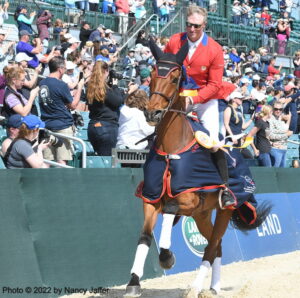
Doug and Quantum Leap when he was the highest-placed U.S. rider at the 2022 Kentucky 5-star.
And as that special horse steps down, Doug is stepping up in his other discipline.
“The jumping, I love it, jumping big fences is as much, if not more, fun than anything else I’ve done. It’s a brand new challenge, completely fresh. I would like to make a (show jumping) team in the future. Without a doubt, it’s a goal of mine.”
In order to pursue it, he has wrapped up his eventing career and put his focus on the painted rails, though he did compete in a dressage Grand Prix with his Pan Am Games mount, Starr Witness.
“I don’t know if there will be a whole lot more of that, but for sure, it’s great experience,” he said.
The eclectic horseman, who also pilots his own plane, pointed out that when he was growing up, the idea was to “make sure you can to go to any discipline and not be tagged as an outsider.”
He comes from an eventing family. His mother, Marilyn Payne, is a trainer and competitor who has been an Olympic judge. His sister, Holly Payne Caravella, also is an eventing trainer and rider.
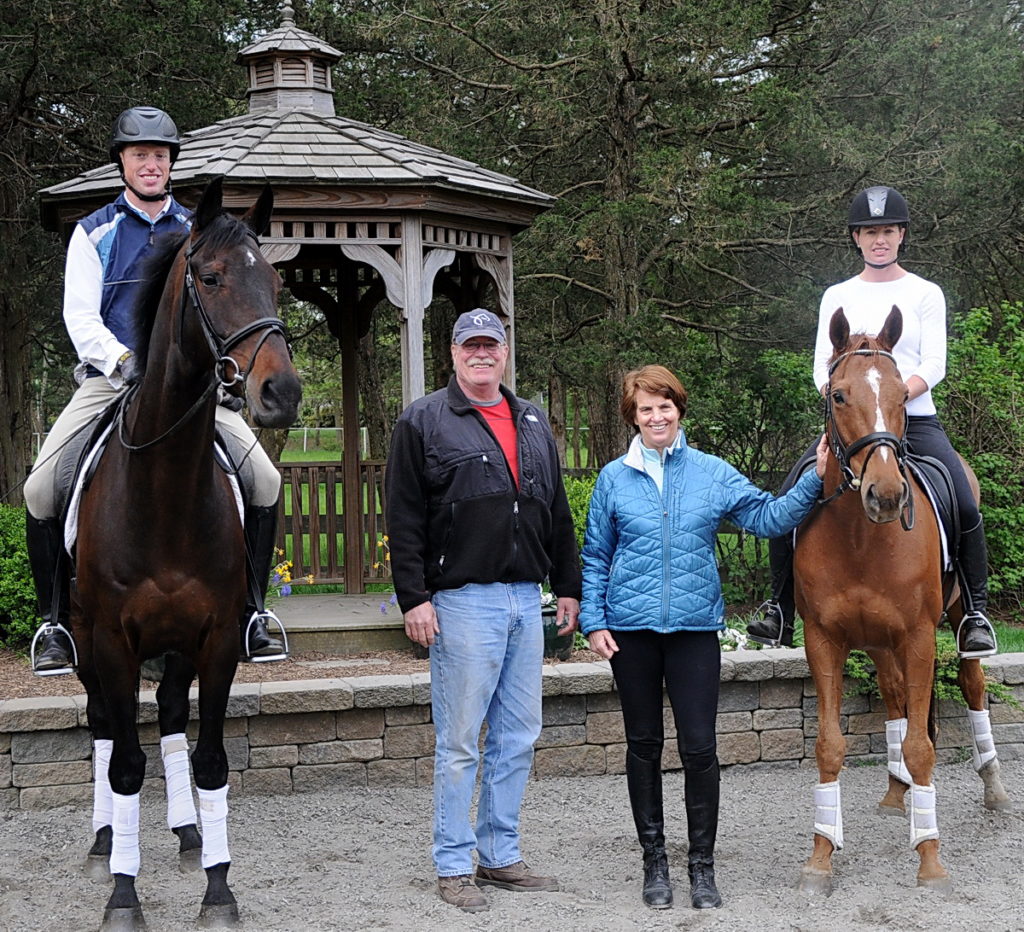
Doug grew up eventing at his home in New Jersey, where he is seen here a few years back with his father, Richard; mother, Marilyn, and sister, Holly Payne Caravella.
Doug, who competed in his first show jumping grand prix in 2022, noted his “headliner right now is a horse called Quintessence. He did three 5-stars jumping last year.”
The 14-year-old Holsteiner, who finished sixth in a 1.5 meter classic at the Winter Equestrian Festival in Wellington last month, evented up to Preliminary as a six-year-old before switching to jumping full time.
“He’s uber careful, he won the 6- and 7-year old finals and a $100,000 grand prix. It was more than I could have ever imagined he would do,” Doug recounted.
Doug pointed out that he and his wife, Jessica, have “never been in a position where we could go out and buy going horses, so we relied a lot on development of younger horses. Six or seven years ago, we started buying more for jumping than eventing, a long-term plan of this happening. It worked pretty well in eventing, and we’ll see if we can’t make it happen here as well.”
He has a six-year-old half-brother to Quintessence, and Europa PVF, a 5-year-old Westfalen by Eldorado, is “probably the best horse I’ve ever had. Then there’s “ a great weanling” coming along. At the same time, Starr Witness is pregnant with Europa’s foal.
“They’re both extreme talents,” Doug pointed out, so his show jumping future seems to offer plenty of potential for him to develop.
At the same time, he emphasizes, “I don’t regret a moment of eventing.”
There were several tragedies in eventing in 2024, including British rider Georgie Campbell’s death after a cross-country accident and Liz Halliday traumatic brain injury in a cross-country fall.
While he’s not leaving the sport because of the danger, Doug acknowledged, “It’s an inherent risk. It can happen anywhere, but certainly your odds are up when the jumps don’t fall down, or slowly fall down. Looking back on it, I was pretty impressed I never got an ambulance ride from an event. It’s something I was pretty proud of, actually.”
He noted, “I’ve been on the USEA (U.S. Eventing Association) Safety Committee for eight years and had a front row seat to every accident analysis in this country. It’s certainly a concern. I’ve always really worked extremely hard to make sure whatever I’m riding I completely trust,”
Still, he pointed out, “You can get hurt doing anything. I know all the organizations are doing as much as they can to reduce the risk.”
Going all-in on the jumping has given Doug a chance to use his time differently.

For Doug Payne, show jumping now is much more than what he used to do as the last phase of an event. (Photo © by Lawrence J. Nagy)
“With the kids, it has freed up our schedule. We’re on the road 40 plus weeks a year. The kids just turned 5 and 7 it will free up time and allow us to do a whole lot more.
“The eventing schedule is so rigid,” he pointed out. With jumping and the plethora of shows from which to choose, “there’s so many more options we never had a chance to explore before. Now we can.”
He likes what he’s found in the show jumping ranks.
Payne Equestrian Sport Service & Sales has “An army of very competent people willing to help,” and cited South Carolina trainer Andrea King (like Doug, a native of New Jersey) for giving pointers while he pursues his new objective.
“I grew up from Pony Club eventing; the perception was always `stuck up show people.’ Our experience has been the opposite. It’s been open, accepting,” Doug related.
He pointed out, “Eventing is very difficult because of few opportunities to prove yourself. If it goes wrong, that’s all somebody talks about for the next however long.”
By contrast, in show jumping, ““You could win another grand prix tomorrow. People are more willing to take a shot and make a mistake. There are so many opportunities to compete and to vie for a top result somewhere.”
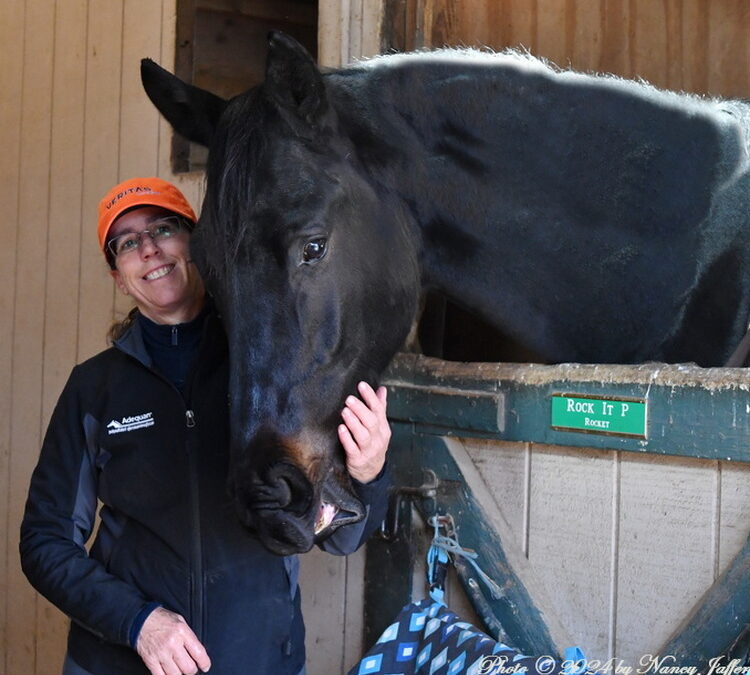
by Nancy Jaffer | Jan 25, 2025
Heather Mason is no dressage queen.
That’s not to say she isn’t successful in her chosen discipline—an impressive collection of ribbons and trophies on display in her Lebanon, N.J., home speaks to expertise in training and riding. But for Heather, it’s not about the prizes or the frills. At Flying Change Farm, it’s all about the horses.
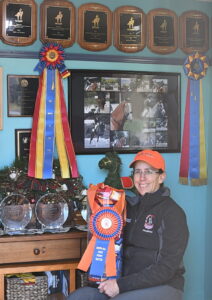
Heather and just a few of her many prizes. (Photo © 2024 by Nancy Jaffer)
“She loves them,” was the simple assessment offered by her friend, Christina Aharoni, who noted that these days, Heather keeps her horses forever.
Heather trains Christina and her daughter, eventer Arielle Aharoni, but offers assistance beyond dressage. Christina calls it “troubleshooting,” whether it’s advice on jumping or bitting.
“That’s an all-around great horseperson that uses a ton of common sense and great basic horsemanship. That’s always what prevails in the end,” Christina asserted.
Heather’s mere presence offers reassurance to her students, and the good results flow from that as well as expert coaching.
Amateur rider Christina Morin Graham was concerned about competing with the professionals in the FEI ranks at the 2024 edition of Dressage at Devon. She wasn’t sure she’d even be able to produce a Grand Prix ride that would qualify her for the show’s feature, the Saturday night freestyle under the lights. Maybe instead she should try the Grand Prix for Special? Morin Graham wondered…
However, Heather was there for support and guidance, which not only got her student qualified, but it gave the amateur a boost that enabled a third-place finish in the freestyle, with a personal best of 74.785 on DSP Dauphin.
“Heather is a master and it’s a privilege to work with her – she has advanced my riding and enabled me to achieve results that I didn’t think were possible,” said Morin Graham.
She characterized Heather as “hard working, dedicated, professional, and resourceful — customizing the approach for each horse and rider to bring out their best. Her depth of dressage experience, training and competing through the levels is extraordinary. She has worked with hundreds of horses, many of which were not necessarily naturally talented, athletic — or sane, for that matter.”
Morin Graham pointed out that at Region 8’s championships, “I think she was the trainer of roughly half the riders in the Open Division Grand prix championship class.”
Over Heather’s career, she’s had nearly 2,200 rides in licensed competition as recorded by the U.S. Dressage Federation. She owns more than half of the 30 horses at her farm, where the herd includes young horses in training, competition mounts and her retired senior citizens. She doesn’t sell her horses any longer because “I hear too many stories about them ending up in bad places and I don’t want to take that chance. I bought some of these as resale horses, but they’ll never be sold.”
As she cheerfully admitted, “I get a little too attached to my horses.”
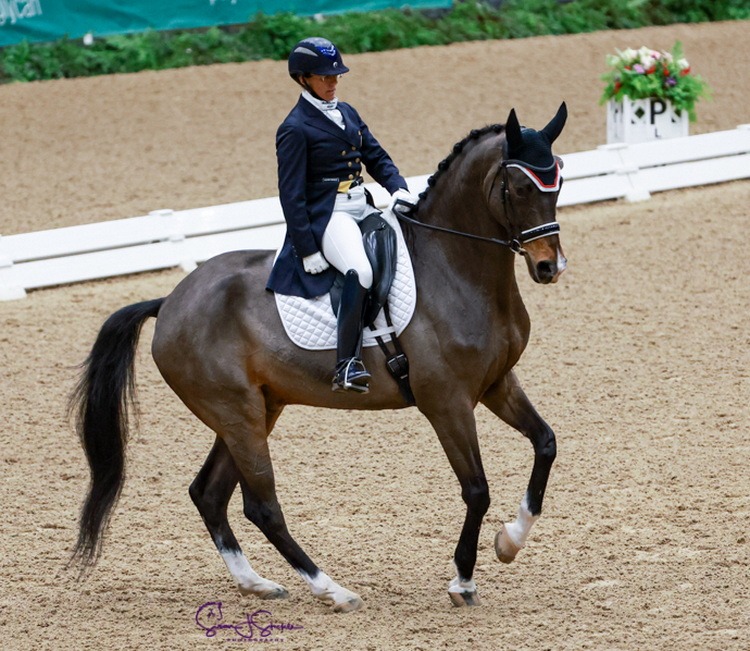
Heather and RTF Lincoln as she does her trademark one-handed double pirouette at the beginning of her freestyle at the 2023 USDF Championships. (Photo © 2024 by SusanJStickle.com)
At her barn, there are a few longtime boarders and people who ship in for lessons. Others take “virtual” lessons, and Heather gives clinics in the tri-state area. On Mondays and Fridays, the trainer spends a few afternoon hours at Red Tail Farm in nearby Bedminster.
Heather was drawn early to teaching. She started giving lessons at age 13 when she belonged to the Spring Valley Hounds Pony Club in New Vernon, where she was an H-A.
“Pony Club was huge, it taught me so much about horse management and care,” said the trainer, who stays in touch with her instructors from those years, Sharon Weidmann, Marilyn Payne and Peggy Hipple.
She graduated from New York’s Skidmore College after majoring in biology and playing polo, but had only one career in mind.
“I always knew I would be doing this as a business,” Heather said matter-of-factly.
Her first acquaintance with horses came when her father was transferred to England by American Express and the family looked at a little farm there which had a pony.
“I fell off him when I tried him, and I still wanted him. The saddle and I slid down his neck—the tack didn’t fit,” she chuckled.
Her parents bought the farm and seven-year-old Heather wound up with Jason, that little Welsh cross who came with the property. The family lived in England for five years, a time when Heather was part of the British culture so strong in riding and hunting,
“I grew up as a little farm kid,” she commented.
Competing in the hunters in England while she “dabbled in everything” over there, Heather discovered when her family moved back to the U.S. that the hunter pony ring was a different place on the other side of the Atlantic Ocean. In England, she recalled, she had ridden her pony in a double bridle, and at some shows, the judge rode the pony.
She enjoyed eventing when she was in Pony Club. Then she bought her first warmblood, Limerick, a Polish Trakehner, as a two-year-old. The mare wasn’t much for jumping but turned into Heather’s first total dressage horse. She got lessons from Irma Hotz as well as her other trainers and did a lot of clinics. In 1984, her pony True Story, a British import, was national champion at First Level, and from that point on, Heather focused on dressage, taking True story to Fourth Level.
She competed at the North American Young Riders Championships with Limerick, who was her first Grand Prix horse, training the horse all the way up to Grand Prix in 1990. Asked how things went with that effort, Heather laughed and reported, “that was back in the days when it was me and Marilyn Payne and I think, Jim Kofford, doing Grand Prix, and we were just trying to break 60 (percent). That was a whole different world of Grand Prix; there were very few Grand Prix horses in the area. We were all struggling. But you learn how to train that way.”
What appealed to her about dressage was the fact that “there was no dead end” to her efforts in the discipline.
“I always knew I was never going to jump grand prix jumps, and I was never going to event advanced, but the dressage I could do all the way.”
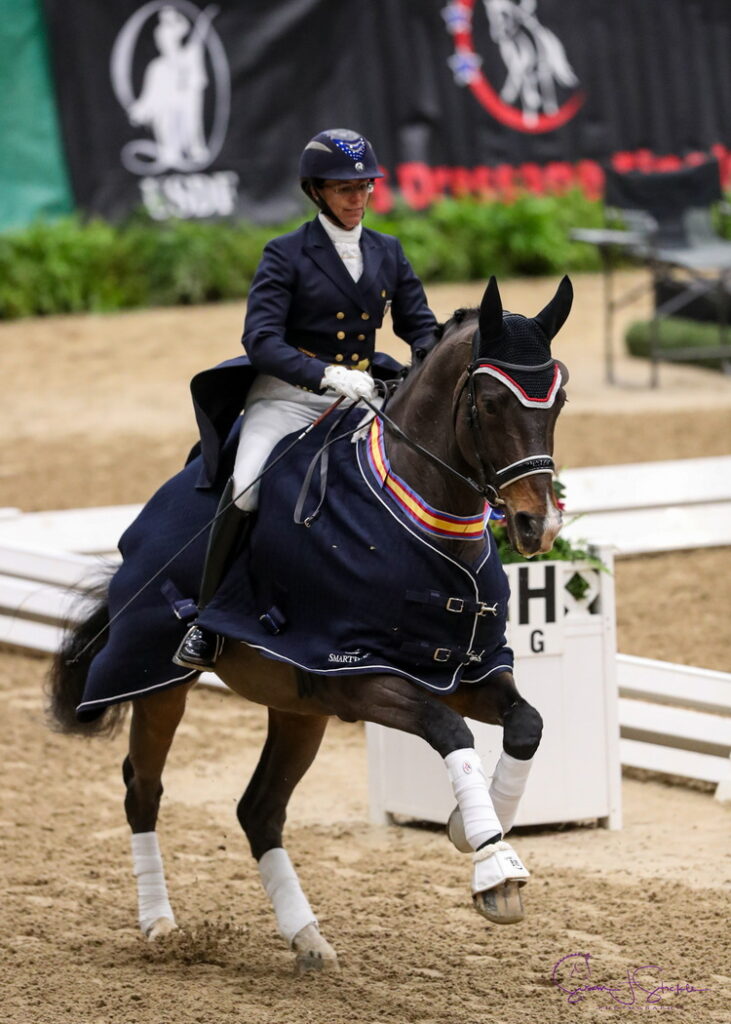
Heather became accustomed to making a victory pass at the USDF Championships with RTF Lincoln. (Photo © 2024 by SusanJStickle.com)
Over the years, she has made her mark, named to the short list for the 2011 Pan American Games with Warsteiner and earning the prestigious $25,000 Carol Lavell Prize to continue her training. She used the money to go to Florida and up her game there, but aside from that, she doesn’t head south because she has “too many horses, too many clients to leave them all winter. Plus, I like to have the winter to train and play with the babies.
“I’ve always gone where the horse will take me, but (making) the (U.S.) team was never like a goal, it’s more about my horses,” she said.
“I never set my life on it because anything can happen. I was told a few times coming up that I’d have to sell these horses and get one good young horse to make the team. I was never interested to give up the horses I had.”
Her inspiration and aspiration involved the training and making the horses the best they could be while building a relationship with each one.
In her view, “it’s more about the horses than the competing. And I like the teaching and I like watching the students move up to the grand prix,” said Heather who has had students earn the U.S. Dressage Federation gold medal, just as she did.
Heather has showed some memorable animals over the years, including Respekt and Zar, but she is most closely associated today with RTF Lincoln, who retired from the top ranks of the sport after winning the Open Grand Prix honors at the USDF’s national championships in Kentucky for the third straight year in 2023. Now 20, in 2024, he dropped down to Small Tour with Heather’s friend and student, amateur rider Alexandra Krossen, after Heather retired him from the Grand Prix ranks. Alex and Lincoln were in the ribbons in their adult amateur classes at the national championships last fall.
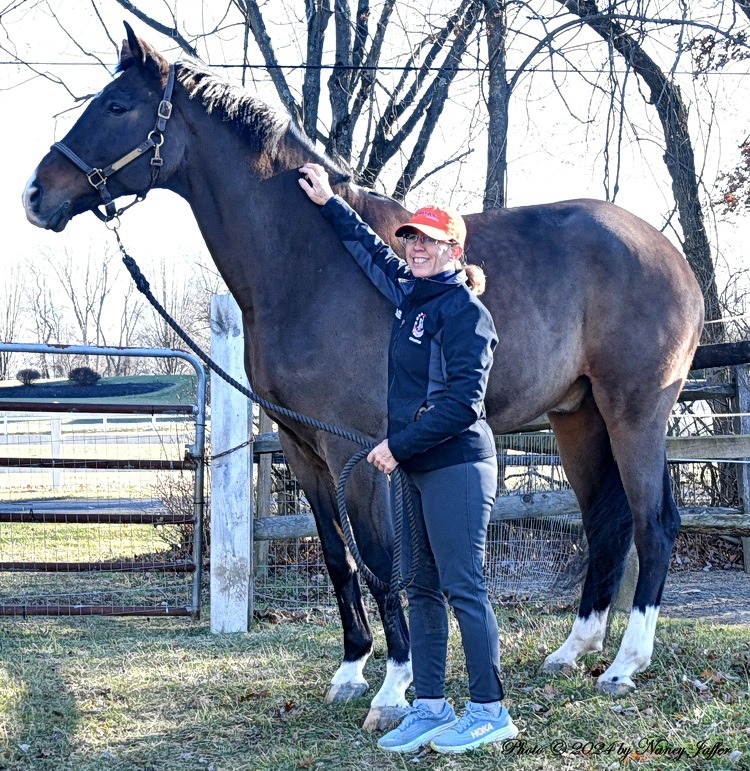
Heather and Lincoln at home. (Photo © 2024 by Nancy Jaffer)
Offering an insight into Heather, Alex said, “I think her love of the animals really helps her get to know them and bring out the best in them. Then she can kind of transfer that to help the riders have success. I did some dressage prior to working with Heather but she’s really just good foundation and understanding the horse and that every horse is not the same. Sometimes you have to think outside the box, which definitely helps my approach to riding in general with multiple horses.”
Alex, who works in the business side of the pharmaceutical industry, has ridden with Heather since 2010.
“Being supportive and having shown a lot herself, Heather understands the pressures so you can ride better,” said Alex who had never been to a recognized dressage show prior to working with Heather.
Heather has enjoyed success with American-bred horses. Lincoln came from a Cornell University program. Heather would break some of the babies from the program and either sell them young or raise them and sell them. It was an affordable way to pick up a warmblood. She got Lincoln as a foal and then Meredith Whaley bought him as a just-broke three-year-old. Both Meredith and Heather showed him up to Fourth Level.
Then things started going wrong. Lincoln got hurt and was two years out of the show circuit. Meredith underwent double hip surgery, and finally, “She decided rehabbing him she didn’t want to ride and compete him anymore,” said Heather, who bought him in 2016 for a dollar. When he got over his suspensory problems, she started him at Prix St. Georges/Intermediate I.
“He’s a tricky horse; he had a wicked spook spin,” Heather pointed out.
“He’d get really hot and started cranking his legs up and down. That actually was useful for the passage work, once he learned to slow it down.”
So there were some issues, but as Heather pointed out, “He does love to show. At home, he likes to be rubbed and scratched and he’s very pushy about it. He goes out every night, unless it’s absolutely awful weather.’
Where does the next horse of Lincoln’s capability come from for Heather?
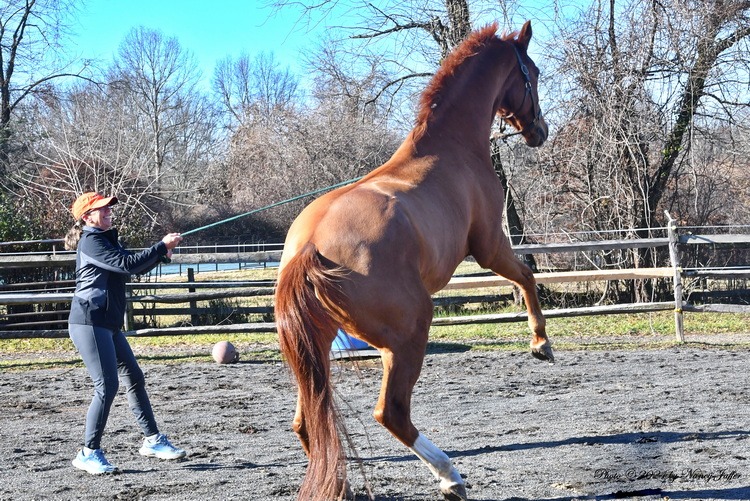
Heather is amused to see Manuskript feeling his oats on a chilly day. (Photo © 2024 by Nancy Jaffer)
Heather, who won the 2024 Adequan/USDF professional Vintage Cup titles (for riders 50 and older) at both Prix St. Georges and Fourth Level, pursues many avenues with the goal of replenishing her string.
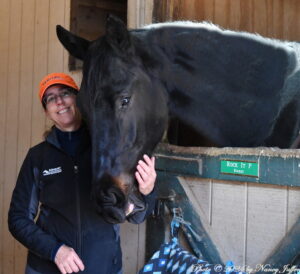
Heather and Rock It P. (Photo © 2024 by Nancy Jaffer)
She has bred her own horses, bought babies and even purchased foals in utero. Starting them from the ground up, she often has someone with her for that; Arielle Aharoni helped last year. But Rock It P, the 2024 Adequan/USDF Materiale Horse of the Year (colt/gelding), was one she handled alone “because he’s my huge, big boy. I did him from the ground up with nobody helping me,” she explained proudly.
Manuskript SCF was 2024 Adequan/USDF Horse of the Year at both Fourth Level and Prix St. Georges, while also winning the Fourth Level Freestyle and Freestyle Challenge honors.
For 2025, Heather has horses between levels, so the USDF championships where she has excelled so often “won’t be a serious goal this year. We have a lot of four-year-olds going to go out to show this year, so I’ll be babysitting.”
Heather’s team includes her mother, Phyllis, who has always been involved with her business. She doesn’t do the braiding anymore, but she keeps her daughter and company well-fed. Alex Krossen lends a hand when needed, while Wendi Freedman manages the business as Lydia Varga and Moises Vega “keep the place running when I’m out showing,” as Heather puts it.
Asked if there’s anything else in her life that she makes time for, Heather smiled and replied, not unexpectedly, “It’s pretty much horses.”
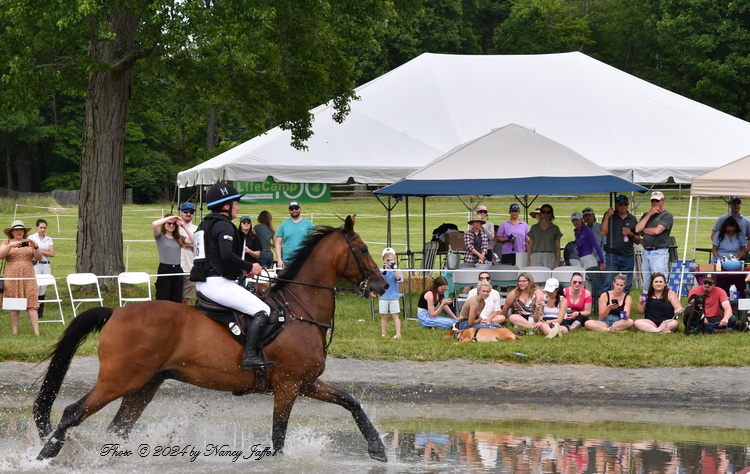
by Nancy Jaffer | Jan 15, 2025
The Essex Horse Trials in New Jersey has lived several lives since its founding in the late 1960s, and now it’s about to embark on yet another.
This year, it will run on Sunday, June 1, for one day rather than two; hold everything at a single venue, Moorland Farm in Far Hills, instead of two locations and offer Starter level for the first time, while dropping Intermediate, which wasn’t well-attended at the other end of the scale. The highest level this spring will be Preliminary.
Despite the fact that the 2024 event made money, there was a question of whether Essex could be held in 2025 because the two-venue concept proved to be very difficult and a strain to organize and facilitate.
Then Marilyn Payne stepped up to become the organizer and board president, suggesting the new, more compact, concept. Few know the sport as well she does. She has ridden at Essex since its early days at the Haller family’s Hoopstick Farm in Bedminster, down the road from Moorland and the U.S. Equestrian Team.
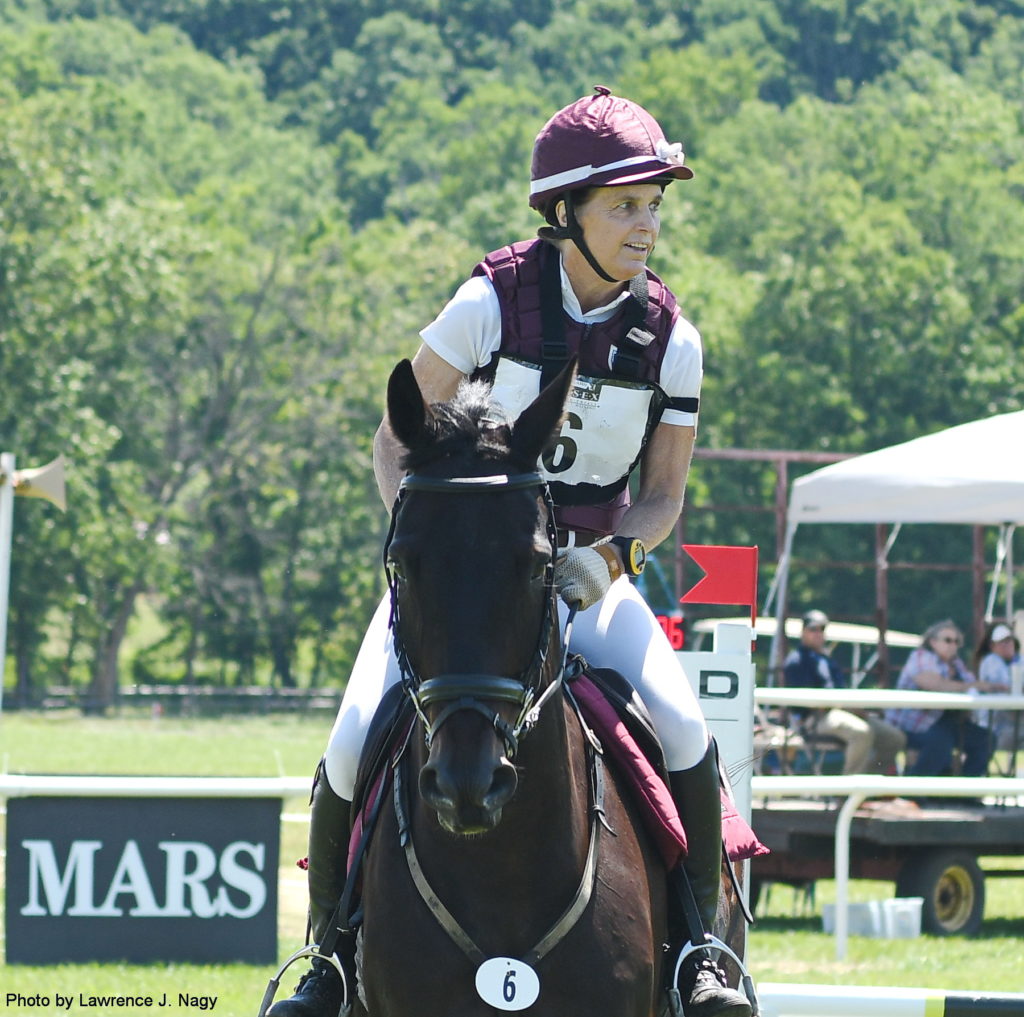
Marilyn Payne is a longtime eventing competitor in addition to her credentials as a teacher and judge. Photo © by Lawrence J. Nagy)
Essex was a major fixture on the eventing circuit from the late 1960s through 1998, when it last ran at the USET in Gladstone. After some of the USET property was sold, it was no longer optimal for the cross-country phase, so the event didn’t go again for 18 years. In 2004, the Essex organization was dissolved and its funds were dispersed, “ending faint hopes that one of the country’s best-known 2-star eventing tests could make a comeback,” as I wrote in a column that year.
Roger Haller told me sorrowfully, “the countryside has been changing and there’s not the critical mass to sustain what was there before.”
But there were many who remembered Essex and missed it. An opportunity to stage all phases at Moorland, also home of the popular Far Hills Race Meeting each October, led to its revival in 2017.
Sadly, Roger had died the year before the return, which was greeted with great fanfare. However, weather problems and date changes hindered growth. A continuing difficulty was the lack of an all-weather ring at Moorland for dressage and jumping. One rainy edition of the event in which footing was far from optimal prompted a move three years ago to the USET Foundation and its all-weather arena for those segments, with cross-country the next day at Moorland.
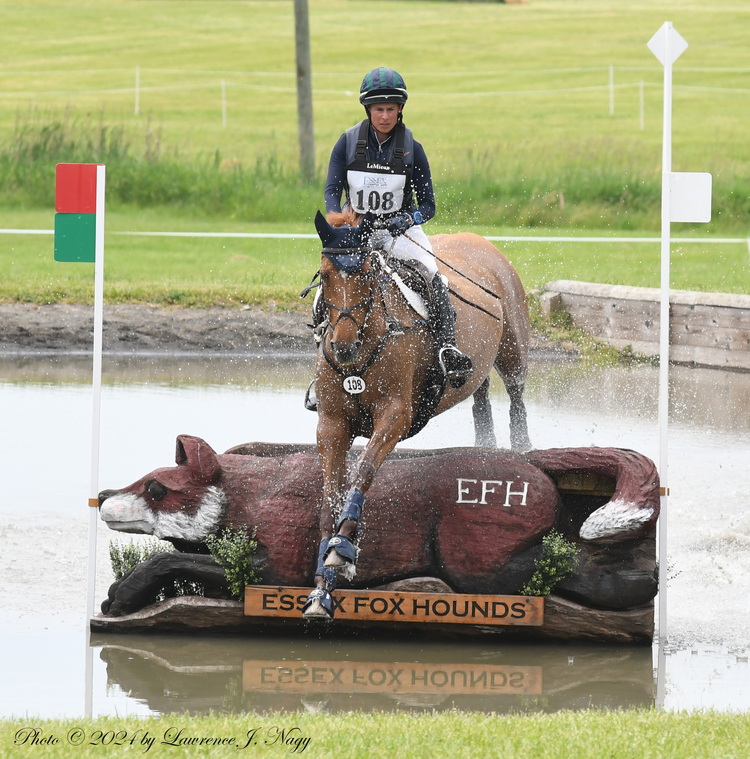
Essex has attracted some big names over the years, including Lillian Heard Wood. (Photo © 2021 by Lawrence J. Nagy)
“Having it at two sites is very, very cumbersome and very expensive,” said Guy Torsilieri, who manages Moorland with Ron Kennedy. Consolidation of the competition in one location for 2025 provided an answer to that problem.
Marilyn, twice an Olympic judge, runs her own Hunterdon County farm that offers lessons, clinics and shows, but despite the demands on her time, she felt Essex should be a priority.
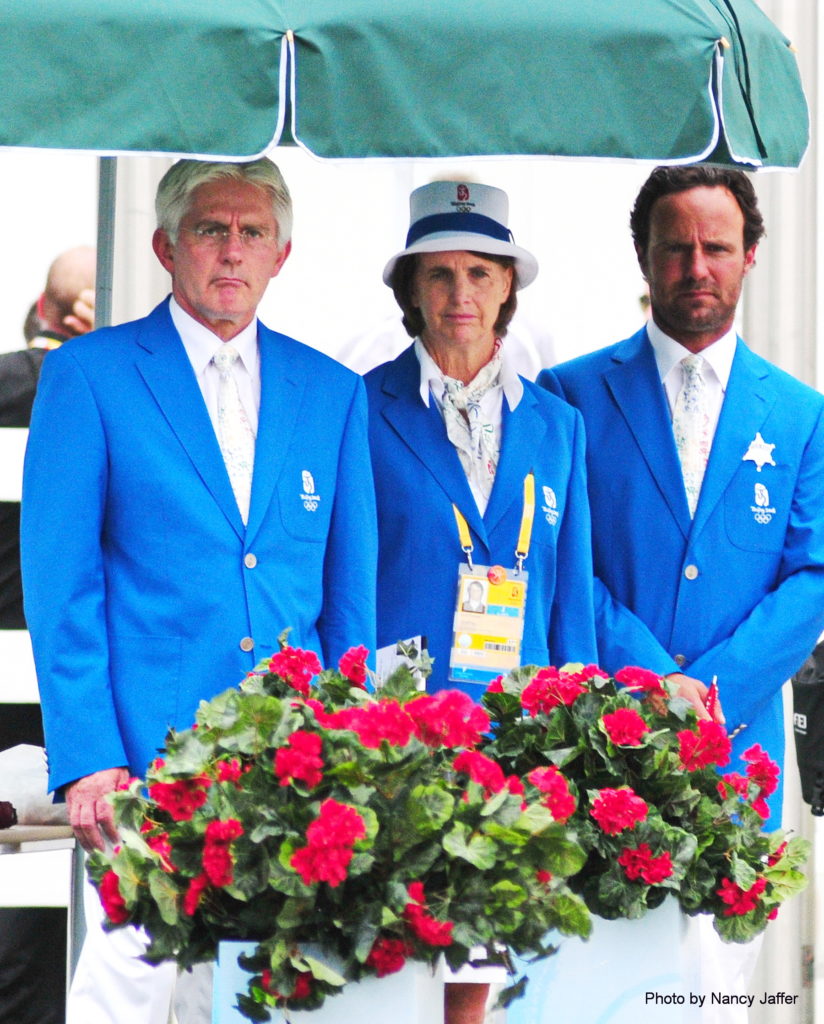
Marilyn judging at the 2008 Olympics. (Photo © 2008 by Nancy Jaffer)
“It’s so important to continue, not only for the riders and the sport, but because we’re losing events all over the country and we don’t want to lose another event,” she commented.
Discussing Moorland, she observed, “It’s a fabulous facility. It’s great for the local people, to get them more involved and let them see what eventing is all about. Let them enjoy it. You’ve got to spread the word, and the best way to spread the word is to have a competition and invite people to come. A lot of people just want to go to one place and in and out on one day.”
She emphasized, “We’re refocusing on the lower levels,” and unlike the higher levels, those participants are not as picky about footing. But Marilyn noted that while she doesn’t expect early June to see the torrential rains that caused a problem when the date was later in the month, there also is a Plan B site for show jumping and dressage at Moorland if mud becomes an issue.
A cocktail party will be held Saturday night before the event, with cross-country course designer Morgan Rowsell giving a guided walk of his route. (He also will be designing the show jumping phase of the event.) With the event on a Sunday, riders are able to come the day before and walk the course. There will be a vendor village offering shops and food.
With the addition of the Starter level, Marilyn expects families to turn out to watch their relatives, so there should be a good crowd, some of whom can take the opportunity to view cross-country from tailgating spots.
Amy Gregonis and Julie Berman, who both were involved previously with the event, are working with sponsors. Marilyn is looking for volunteers to work at the event. Those interested in sponsoring or volunteering may contact her at applewoodfarm@comcast.net.
The car show, held in the past at Moorland on cross-country day, is moving to a September date, which allows all the focus to be on Essex. The event’s beneficiary is the LifeCamp in Pottersville, a century-old venture that provides a day camp each summer for 300 kids ages six through 14 from the greater Newark area.
A visit to the cross-country course is an enjoyable field trip for the campers and their parents. They picnic by the water complex, really getting into watching the horses splash through.
Guy hadn’t been optimistic about the event’s future before Marilyn took over.
“I was very saddened to say it’s going to go away again, because I don’t think it would come back. I think it’s important to keep equestrian activities in the area. Ron and I are thrilled they are going to give it another whirl,” Guy commented.
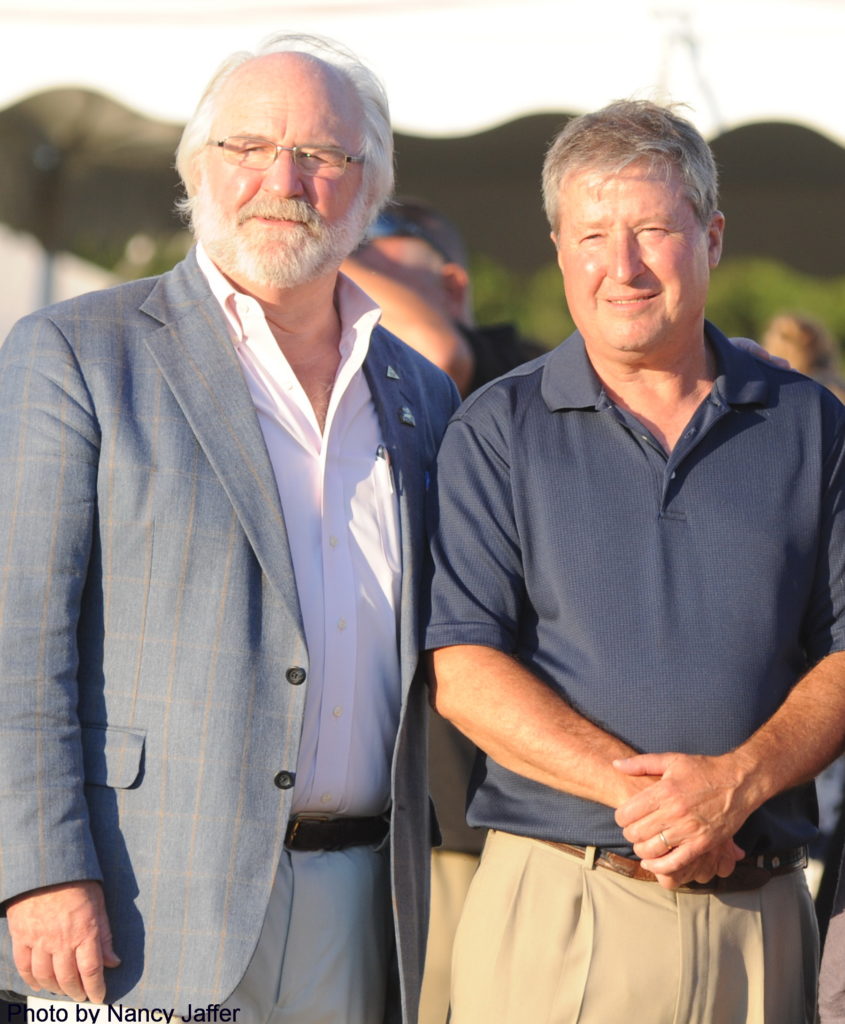
Guy Torsilieri and Ralph Jones. (Photo © by Nancy Jaffer)
“I think it’s a good plan, I think it will be successful. With the new model, the budget is less than half of what it was last year. I think they’ll get a lot of support at the lower level.”
Of Marilyn, he said, “I was amazed and impressed how dynamic she is and what she wants to do. She’s getting a lot of enthusiasm locally.”
Guy also commented on the tenacity of Ralph Jones, a former co-organizer of the event, who was an advocate for keeping it going. He remains on the board as treasurer and is looking forward to working with Marilyn.
“She’s hoping to make it more of a local effort than trying to get the big professionals. It was our best chance of keeping it alive,” Ralph pointed out.
“I give Marilyn a lot of credit. She’s good. It’s going to be more low-key this year. Riders didn’t like the two-day format.” He appreciate’s Guy’s suggestion to “make it a big backyard barbecue. We feel good about it – it’s on its third life.”

by Nancy Jaffer | Jan 9, 2025
During a four-week competition-free window at the Wellington International showgrounds in Florida, a lot of improvements have been accomplished—but more are to come once showing is over for the season.
Murray Kessler, Wellington International’s CEO, gave a report on progress at the facility to the Village’s Equestrian Preserve Committee Wednesday night.
The retired executive and former U.S. Equestrian Federation president took his post last fall because he was “concerned with the direction it might go” following the showgrounds’ purchase by its former owners. Since then, more investors are joining the group.
The venue, the home of the Winter Equestrian Festival, employs 500 people during the height of the show season, when 2,700 horses are competing weekly. The “root problem” of the horse show is that the grounds were built for a third of the number of horses that are there today, Murray said.
He believes Wellington International, formerly known as the Palm Beach International Equestrian Center, is “the anchor of this community and it can’t be a healthy community unless the horse show is healthy. I care about the horses first and I care about the sport first and everything else good that will happen to Wellington will happen on that basis.”

Murray Kessler addressing Wellington’s Equestrian Preserve Committee.
His vision is “to keep Wellington International the premier horse sports destination in the world.”
Murray noted that is not to say it’s the best horse show individually in the world, pointing out there are some great ones. But “there’s nothing like Wellington anywhere else in the world where there’s 1,000 horse farms in close proximity.”
A key improvement will be the addition of additional land from “Pod F” to expand Wellington International and enable dressage to move from its current home at the Global grounds a half-mile away, where a golf community will be built. Murray doesn’t expect that to happen before 2027 and it could be 2028. That’s the deadline for completing work on Pod F, as it becomes an operating part of the showgrounds and takes 1,000 horses off the area of what is the current facility, leaving room for dressage and hunters to have their own space.
In the meantime, three rings have been built on Pod F to give riders a place where they can work their horses away from the crowded main showgrounds. FEI stabling is set to expand to 14 acres.
There will be a better opportunity to grow sponsors and hospitality when there is a better design for a unified showgrounds. Murray noted at the moment, there is no hunter VIP, and he criticized the VIP arrangement for dressage at Global, where the food must be driven to the site from a small kitchen at Wellington International.
“Believe it or not, we don’t make money on entries,” he stated. “We make money on sponsors and hospitality.” While the existing grounds is profitable, money for improvements is self-generating.
There has been a flurry of cleaning, painting and landscaping at the showgrounds, where 3,000 stalls were power-washed. Bathrooms are being cleaned around the clock, eight tractor-trailer loads of junk have been taken off the premises.
“While we still have a long way to go, the property is in better shape than it’s been in a very long time,” Murray reported. He has appointed an advisory committee with reps from hunters, jumpers, dressage and para-dressage to be his “eyes and ears” about what is needed at the showgrounds.
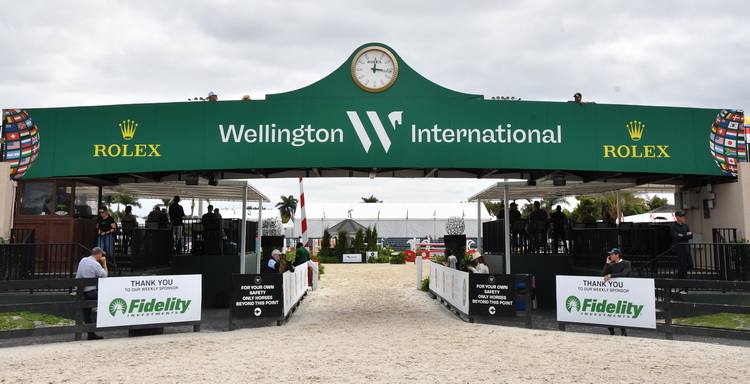
The entrance to the International arena at Wellington International.
Improvements that have been installed at Wellington International since he came on board include new stadium LED lighting, which makes the setting in the International Arena as bright as daylight, and offers flexibility in terms of special effects that can be created. With the old vapor lights, once they were turned off, it took a half-hour to get them going again, and the illumination they offered was “gray,” which Murray deemed to be getting unsafe. A new jumbotron will do split screens and replays with graphics that are “terrific.”
As Michael Stone, Wellington International’s president pointed out during a Thursday press conference, production values are being improved “so it becomes much more like any sort of major sporting event. By increasing the level, you’re going to enhance the sport, and enhancing the sport is going to attract more people to come. That’s why we need enhanced production, to show people this really is a top class sport, like the U.S. Open or the Masters.”
The last grand prix at WEF in March will be worth $750,000, a record for the show. It is the finale for a new series from Rolex, a longtime sponsor of Wellington International.
Still to be accomplished are more improvements to wi-fi, refurbishment of footing in the rings and other details that will happen during a break in the schedule.
Murray pointed out that equestrian is the biggest sport in Palm Beach County, with $400 million in economic impact. The next biggest sport in the county is minor league baseball at $60 million. Wellington International is the big time–there are 35 Olympic riders who will be showing at WEF and Global dressage, with eight of the world’s top 10 in show jumping scheduled to be on hand.
Murray is pleased at the feedback he’s getting for what has happened in a short amount of time. In the past, there has been an over-promise and under-deliver situation at the showgrounds, which didn’t have the resources or leadershp to fix things. Murray is operating on the opposite basis, and it’s working.
“I feel a sense of excitement from the community,’ the CEO said, stating the reaction is, “Wait a minute it’s turned a corner and the uncertainty is behind us.”
by Nancy Jaffer | Jan 9, 2025
Allegations of horse abuse “involving numerous horses over an extensive period of time” has prompted the FEI (international equestrian federation) to provisionally suspend American eventer Andrew McConnon and open disciplinary hearings in his case. The suspension is reciprocal with the U.S. Equestrian Federation.
He finished twenty-seventh with Wakita 54 at the Burghley 5-star in September and seventeenth with the same Dutchbred mare in the Kentucky 5-star last May. McConnon also rode Ferrie’s Cello on the U.S. team in the eventing Nations Cup at Strzegom, Poland, in 2023, when he was twenty-sixth.
McConnon is not allowed to participate in any competitions or activities related to the FEI or USEF while on suspension. The FEI declined further comment on the case.
In order to ensure the integrity of the ongoing legal proceedings, the FEI will not provide further comment on this case at this time
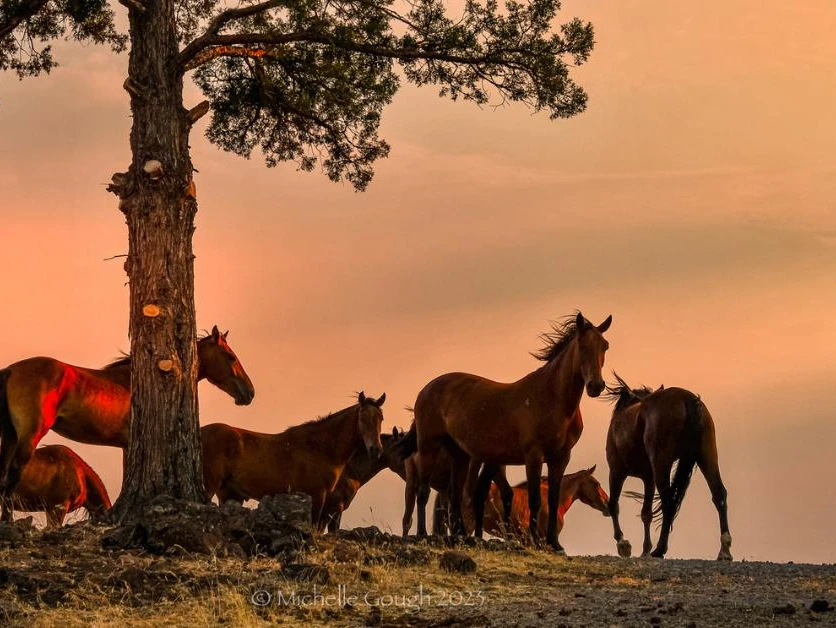
by Nancy Jaffer | Jan 13, 2025
How can the risk of devastating western wildfires be reduced in the future?
Could part of the solution be horses—wild horses?
There is so much blame to go around for the horrific fires raging in Los Angeles. From feckless governmental “leadership” at several levels, to an empty reservoir and fire department budget cuts, they all add up to lack of planning for the inevitable. Another case in point: diverting snow melt from the Sacramento River tributaries into the sea to help the delta smelt (fish), rather than making sure reservoirs are full.
The result is loss of lives, houses disintegrating to rubble and Armageddon for horses and other animals in what some have labeled the country’s biggest natural disaster.
There is concern about how the fires will affect plans for the 2028 Los Angeles Olympics. The authoritative “Inside the Games” newsletter noted that the fires are, “raising alarm bells” for the Olympic committee, with several venues “under threat.”
On Thursday, the newsletter noted, “With fatality figures that alarm even the most skeptical, the land reduced to ash, and reconstruction costs estimated at an unfathomable $135 billion, the city’s ability to host the world’s largest sporting event is now subjected to thorough investigation.”
The current situation means that “the challenges of ensuring the Games’ safety are becoming increasingly apparent.”
Years of permitting delays on such forest management issues as thinning out brush and tree density, with controlled burns designed to stop the rapid spread of fire and toxic smoke, have been hampered by lawsuits from “climate activists.”
After the current blazes subside, it’s past time to do something that can decrease future devastation. A key step would be removing the brush and undergrowth that have acted as tinder. And that’s where the horses come in.
William Simpson of the Wild Horse Fire Brigade says he knows just how it should be done,
The former logger and rancher manages a wild horse herd on the border of California and Oregon, so every day, he sees the capability of these animals to clean up rough terrain where cattle and sheep don’t graze anymore, and herds of deer and elk have diminished.
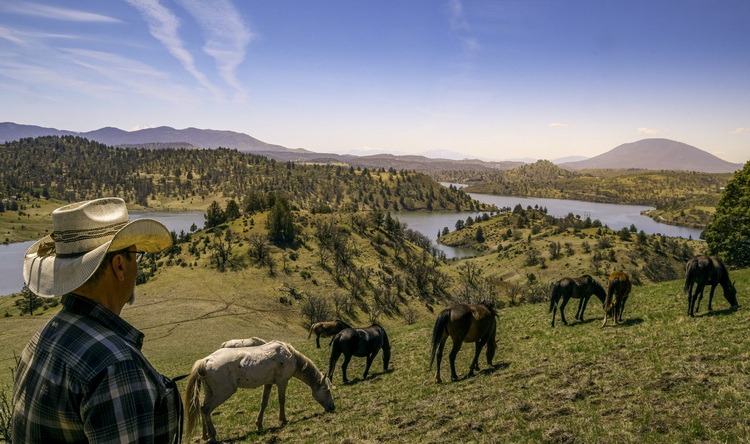
William Simpson of the Wild Horse Fire Brigade with part of the wild horse herd that lives on the California Oregon border. (Photo courtesy Michelle Gough)
Mustangs have no problem navigating the undulating ground and consuming underbrush that acts as kindling for wildfires, when a spark hits and Santa Ana winds blow. He points out that unlike domestic horses, the mustangs are able to consume weeds and brush with no ill effects. Simpson characterizes them as gardeners, because seeds in manure are viable, which works for starting fresh growth instead of leaving ground barren. On the other hand, seeds are destroyed in the complex digestive systems of ruminant animals, such as cattle, he pointed out. And he contends wild horses do not share domestic horses’ fear of fire.
“We’re trying to get the LA fire department, the Malibu fire department, the Malibu homeowners association and the Palisades homeowners association to call me up and say, `You come down here and tell us how to do this’ and I would do it,” said Simpson.
“I do everything I do for free. The bottom line is, we want to provide guidance to communities, legislators, to people who want to reduce toxic smoke and wildfires and stop these fires.”
All the approximately 39,000 horses remaining in the wild and the 70,000 or so living in cramped Bureau of Land Management holding facilities could be used in the project, he contended. Rewilding will “put them where they really belong and where they reduce fires,” Simpson maintained. He estimates each wild horse will eat 30 pounds of grass a day, or 5.5 tons a year on a mere 7 percent of land available for grazing.
Simpson said there is no conflict of interest on the land involved “no lithium mining, no cattle” but noted, “it (the dried vegetation) burns like crazy.” His own home was saved from destruction by fire in 2018 due to a fire break created by grazing wild horses.
“My goal, with our all-volunteer nonprofit, is to provide proper evolutionary-level genetic conservation of these relatively few remaining wild horses, which hold the last bastion of superior equine genetic vigor,” he said.
“If I put out one horse on every 300 acres for fuel reduction, I could re-wild every horse in America in a safe area where nobody is going to mess with them. I only need 3 million acres. Everybody wins. The horses get to be wild and free, they’re not stepping on anybody’s toes.”
You can learn more by watching a video about using horses for fire prevention from AM Best, the world’s oldest credit agency, specializing in the insurance industry. To see the video, click on this link
Numerous organizations are accepting donations connected with helping fire victims. Pets affected by the fire are being helped by the Pasadena Humane Organization
It is working to log every report of animals left behind and dispatching search and rescue teams as quickly as possible in areas that are safe to enter. They are prioritizing reports of animals seen alive in the area and in urgent need of medical attention, as well as cases in which owners have informed them they were forced to leave their pets behind. Fleet of Angels is geared to helping horses who are victims of disasters. The Equestrian Aid Foundation is also pitching in. This is a link to a private rescue seeking funds. Check to see whether your favorite charity also has a role in helping fire victims.

























